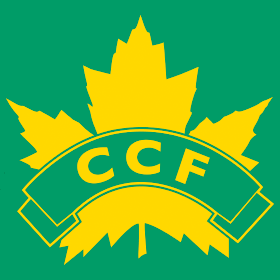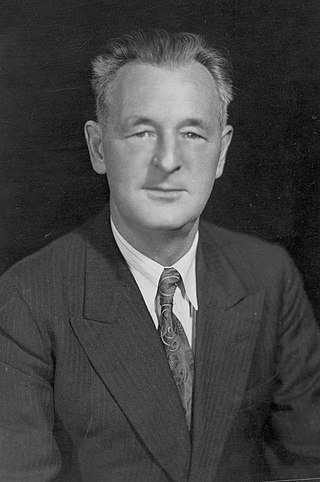
The Co-operative Commonwealth Federation ; from 1955 the Social Democratic Party of Canada, was a federal democratic socialist and social-democratic political party in Canada. The CCF was founded in 1932 in Calgary, Alberta, by a number of socialist, agrarian, co-operative, and labour groups, and the League for Social Reconstruction. In 1944, the CCF formed one of the first social-democratic governments in North America when it was elected to form the provincial government in Saskatchewan.
The Progressive Party of Canada, formally the National Progressive Party, was a federal-level political party in Canada in the 1920s until 1930. It was linked with the provincial United Farmers parties in several provinces, and it spawned the Progressive Party of Saskatchewan, and the Progressive Party of Manitoba, which formed the government of that province. The Progressive Party was part of the farmers' political movement that included federal and provincial Progressive and United Farmers' parties.

The Communist Party of Canada is a federal political party in Canada, founded in 1921 under conditions of illegality. Although it does not currently have any parliamentary representation, the party's candidates have previously been elected to the House of Commons, the Ontario legislature, the Manitoba legislature, and various municipal governments across the country. The party has also made significant contributions to Canada's trade union, labour, and peace movements.
United Farmers may refer to:
The Saskatchewan New Democratic Party (NDP) is a social-democratic political party in the Canadian province of Saskatchewan. It currently forms the official opposition, but has been a dominant force in Saskatchewan politics since the 1940s. The party is the successor to the Saskatchewan section of the Co-operative Commonwealth Federation (CCF), and is affiliated with the federal New Democratic Party.
There have been various groups in Canada that have nominated candidates under the label Labour Party or Independent Labour Party, or other variations from the 1870s until the 1960s. These were usually local or provincial groups using the Labour Party or Independent Labour Party name, backed by local labour councils made up of many union locals in a particular city, or individual trade unions. There was an attempt to create a national Canadian Labour Party in the late 1910s and in the 1920s, but these were only partly successful.

The United Farmers of Alberta (UFA) is an association of Alberta farmers that has served different roles in its 100-year history – as a lobby group, a successful political party, and as a farm-supply retail chain. As a political party, it formed the government of Alberta from 1921 to 1935.

The Canadian Wheat Board was a marketing board for wheat and barley in Western Canada. Established by the Parliament of Canada on 5 July 1935, its operation was governed by the Canadian Wheat Board Act as a mandatory producer marketing system for wheat and barley in Alberta, Saskatchewan, Manitoba, and a small part of British Columbia. It was illegal for any farmer in areas under the CWB's jurisdiction to sell their wheat and barley through any other channel than the CWB. Although often called a monopoly, it was actually a monopsony since it was the only buyer of wheat and barley. It was a marketing agency acting on behalf of Western Canadian farmers, passing all profits from its operation back to farmers. Its market power over wheat and barley marketing was referred to as the "Single Desk".

The province of Alberta, Canada, has a history and prehistory stretching back thousands of years. The ancestors of today's First Nations in Alberta arrived in the area by at least 10,000 BC, according to the Bering land bridge theory. Southerly tribes, the Plain Indians, such as the Blackfoot, Blood, and Peigans eventually adapted to seminomadic plains bison hunting, originally without the aid of horses, but later with horses that Europeans had introduced.

William Irvine was a Canadian politician, journalist, and clergyman. He served in the House of Commons of Canada on three occasions, as a representative of Labour, the United Farmers of Alberta, and the Co-operative Commonwealth Federation. During the 1920s, he was active in the Ginger Group of radical Members of Parliament (MPs).
The Socialist Party of British Columbia (SPBC) was a provincial political party in British Columbia, Canada, from 1901 to 1905. In 1903, the SPBC won seats in the Legislative Assembly of British Columbia.

Socialism in Canada has a long history and along with conservatism and liberalism is a political force in Canada.

George Hara Williams was a Canadian farmer activist and politician.
The Progressive Party of Saskatchewan was a provincial section of the Progressive Party of Canada and was active from the 1920s to the mid-1930s. The Progressives were an agrarian, social democratic political movement. It was originally dedicated to political and economic reform; it also challenged economic policies that favoured the financial and industrial interests in Central Canada over agrarian interests. Like its federal counterpart it favoured free trade over protectionism.
The Manitoba Grain Growers' Association (MGGA) was a farmer's association that was active in Manitoba, Canada, in the first two decades of the 20th century. It provided a voice for farmers in their struggle with grain dealers and the railways, and was influential in obtaining favorable legislation. The MGGA supported the Grain Growers' Grain Company, a cooperative of prairie farmers, and its organ the Grain Growers' Guide. At first it remained neutral politically, but in 1920 it restructured as the United Farmers of Manitoba in preparation for becoming a political party.

The Saskatchewan Grain Growers' Association (SGGA) was a farmer's association that was active in Saskatchewan, Canada in the early 20th century. It was a successor to the Territorial Grain Growers' Association, and was formed in 1906 after Saskatchewan became a province. It provided a voice for farmers in their struggle with grain dealers and the railways, and was influential in obtaining favorable legislation. The association initially resisted calls to create a farmer-owned marketing company. Later it did support formation of the Saskatchewan Co-operative Elevator Company. The SGGA helped the Saskatchewan Wheat Pool, a cooperative marketing organization, to become established in 1924. In 1926 the SGGA merged with the more radical Farmers' Union of Canada, which had earlier split from the SGGA, to create the United Farmers of Canada,
The Alberta Farmers' Association (AFA) was a farmer's association that was active in Alberta, Canada from 1905 to 1909. It was formed from the Alberta branch of the Territorial Grain Growers' Association (TGGA) when Alberta became a province in 1905. It provided a voice for farmers in their struggle with grain dealers and the railways. In January 1909 it merged with the Canadian Society of Equity to form the United Farmers of Alberta.

Edward Alexander Partridge was a Canadian teacher, farmer, agrarian radical, businessman and author. He was born in Ontario but moved to Saskatchewan where he taught and then became a farmer. He was active in the Territorial Grain Growers' Association (TGGA), founded in 1902, which addressed various problems with the Western Canada grain market. He founded the cooperative Grain Growers' Grain Company, the predecessor of the United Grain Growers, and the Grain Growers' Guide, a widely distributed weekly paper. His "Partridge Plan" was a broad and visionary proposal for addressing a wide range of farmers' issues, eliminating many abuses caused by the near-monopoly of grain elevator companies, and resulted in important reforms by the provincial governments. Patridge was named a National Historic Person in 2018.









